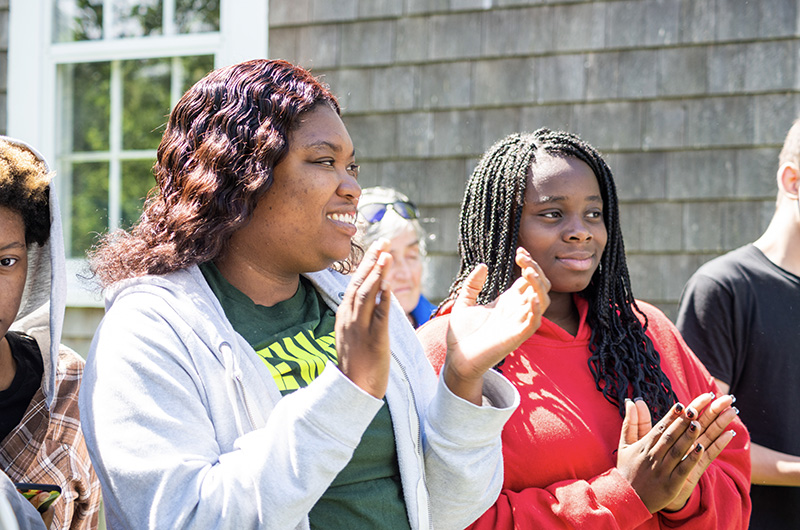The Neighborhood First Program is located in Bristol, Pa. just outside of Philadelphia. The organization works with teens and preteens, many of whom are dealing with issues of incarcerated family members and temporary homelessness. The children spend anywhere from 30 days to three years with Neighborhood First, which provides food, activities, in-home visits, mentorship and summer programming for the students.
And beginning 15 years ago, Neighborhood First has come to Martha’s Vineyard for a week in June — an outing designed to bring the members into a relaxed, rural environment with easy access to the outdoors.
This past week Neighborhood First returned to the Island after a multiple-year hiatus. Traditionally, the group stayed in a house on Pennacook avenue but when the house sold a few summers ago the program lost its housing. But this summner Polly Brown of Vineyard Haven stepped and donated a week’s stay at her house.
Speaking with the Gazette on Tuesday, the students discussed their week thus far, visiting the Aquinnah Cliffs, paddle-boarding, exploring the farmers’ market and making plans to jump off the Jaws bridge — while also sharing the anxieties many first-time jumpers face.

One member of the group, Julian Smalls, bemoaned the trip’s greatest lost opportunity — a photo-op with the Obama family.
Eric Adams, an Island housepainter, practicing therapist, and host of the Gazette podcast Shed, served as Neighborhood First’s program director decades ago when he lived in Philadelphia, where he grew up. He helped bring about the annual vacations to the Vineyard.
“There’s a quality of life here, a sense of peace and safety and connectedness to nature, and being surrounded by water,” Mr. Adams said. “I thought that could have a beneficial effect for kids who had never experienced anything like that.”
After the first few trips proved a success, the Vineyard community rallied around the students, Mr. Adams said.
“The community here really enjoyed having Neighborhood First here, too. So I would ask people, ‘Can we borrow your house? Can we borrow your kayaks? And will you take us out sailing?’ And to a person, everybody said, ‘Man, that was great, those kids were awesome, we love the staff, we’d love to have them back,’” Mr. Adams said.
In the years that Neighborhood First has been taking students to the Island, much about the trip has changed.
“Part of the evolution also is that we’re more diverse now,” said Walt Mimms, the current program director. When Neighborhood First was founded, Mr. Mimms explained, the program tailored itself towards young men of color. But its mentees now stretch across boundaries of race, gender, identity and age. The youngest member of this year’s trip is 12, the oldest 16.
Avery Fourroux, one of the group’s older students, said he had been in and out of the program for three years.
“Before I came to Neighborhood First, I was shy, I was uncomfortable, I was lost,” he said. But the program helped teach him “the idea that you can stand up for more than yourself.”
Now, he said, the staff sees him — and he sees himself — as something of a role model and mentor for the younger students.
Miah Turner agreed about the effects the program has had on her. “[Neighborhood First] gives everybody a chance to show that they’re not just bad or how everybody looks at them when they first see them,” she said.
In addition to the recreational outings, the group attended last Sunday’s vigil at Beetlebung Corner, honoring victims of police brutality. The students had their own stories to share. Donovan O’Brien opened the vigil by talking about Walter Wallace, Jr., Philando Castille and Stephen Clark, all victims of police violence, before turning to a more personal story.
“I am here to memorialize the mistreatment of one due to something they were born with and cannot control,” he said. “I have a friend back where I come from who witnessed his best friend — a child, a friend, and a family member, one of his cousins — get shot and the police officer at the time got away with it. I saw my friend crying in school due to this. It’s something truly unholy, sick,” Donovan said.
Donovan’s words were a sobering introduction to the morning vigil, a striking reminder about the ripple effects of systemic violence.
Amid all the hubbub of the trip — farmers markets and vigils, paddleboards and interviews — many chose to simply enjoyed the piece and quiet that the Island provides.
“You can hear the birds chirping without that many cars going by, without the sound of a train breezing past you at whatever miles per hour they go,” Avery said. “There’s a level of peace here, and serenity.”






Comments (1)
Comments
Comment policy »